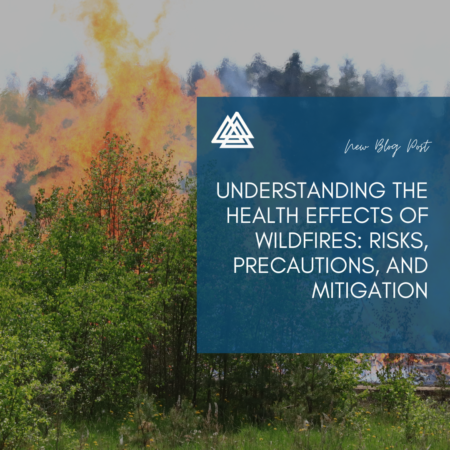 In recent years, wildfires have increasingly become a prevalent environmental concern, affecting communities around the world. Beyond the immediate destruction of homes and natural habitats, wildfires also pose significant health risks to those exposed to their smoke and aftermath. Understanding these health effects, along with preventive measures and mitigation strategies, is crucial for safeguarding public health during and after wildfire events.
In recent years, wildfires have increasingly become a prevalent environmental concern, affecting communities around the world. Beyond the immediate destruction of homes and natural habitats, wildfires also pose significant health risks to those exposed to their smoke and aftermath. Understanding these health effects, along with preventive measures and mitigation strategies, is crucial for safeguarding public health during and after wildfire events.
Health Risks Associated with Wildfires
- Respiratory Issues: The most common health effect of wildfires is respiratory problems. Smoke from burning vegetation and other materials releases harmful particles and gases, including carbon monoxide, volatile organic compounds (VOCs), and fine particulate matter (PM2.5). These pollutants can irritate the respiratory system, exacerbate asthma and other respiratory conditions, and increase the risk of respiratory infections.
- Cardiovascular Health: Fine particulate matter (PM2.5) from wildfire smoke can also penetrate deep into the lungs and enter the bloodstream, triggering cardiovascular issues such as heart attacks, strokes, and worsening of existing heart conditions.
- Eye and Skin Irritation: Wildfire smoke can cause eye irritation, redness, and discomfort. Skin exposure to smoke particles and ash may lead to irritation, itching, and exacerbation of dermatological conditions.
- Mental Health: The stress and anxiety caused by wildfires, especially when coupled with evacuation orders and property loss, can have significant impacts on mental health. Post-traumatic stress disorder (PTSD), depression, and anxiety disorders are common among individuals affected by wildfires.
Vulnerable Populations
Certain groups are more vulnerable to the health effects of wildfires:
- Children: Their developing respiratory systems make children more susceptible to respiratory illnesses caused by wildfire smoke.
- Elderly Adults: Older adults are at higher risk of cardiovascular and respiratory complications exacerbated by smoke exposure.
- Individuals with Pre-existing Conditions: Those with asthma, chronic obstructive pulmonary disease (COPD), heart disease, or diabetes are more likely to experience severe health effects from wildfire smoke.
Precautions and Mitigation Strategies
- Stay Informed: Monitor local air quality reports and wildfire updates from reliable sources, such as the Environmental Protection Agency (EPA) or local health departments.
- Limit Outdoor Activity: During periods of poor air quality, especially when smoke is visible or odor is noticeable, reduce outdoor activities and physical exertion.
- Indoor Protection: Keep windows and doors closed to prevent smoke from entering indoor spaces. Use air purifiers with HEPA filters to improve indoor air quality.
- Personal Protective Equipment: If outdoors in smoky conditions, wear N95 respirator masks to reduce inhalation of smoke particles. Cloth masks do not provide adequate protection against fine particulate matter.
- Evacuation Planning: Prepare an emergency evacuation plan and assemble a “go bag” with essential items, including medications, important documents, and supplies for pets.
Post-Wildfire Considerations
After wildfires have been contained, additional precautions may be necessary:
- Assess Property Damage: Inspect your home and surrounding areas for ash, debris, and potential hazards.
- Air Quality Testing: Test indoor air quality for lingering smoke particles and pollutants.
- Seek Medical Attention: If you experience symptoms such as difficulty breathing, chest pain, or severe irritation, seek medical attention promptly.
Wildfires are not only environmental disasters but also significant threats to public health due to the release of harmful pollutants into the air. By understanding the health risks associated with wildfires and taking proactive measures to protect ourselves and our communities, we can mitigate the impact of these natural disasters on our well-being. Stay informed, prioritize safety, and take steps to minimize exposure to wildfire smoke to safeguard your health and that of your loved ones. Together, we can build resilience and prepare for a safer future amidst the challenges posed by wildfires.
